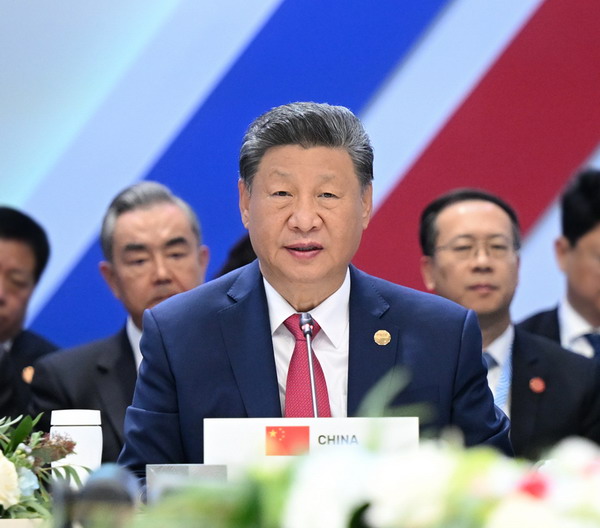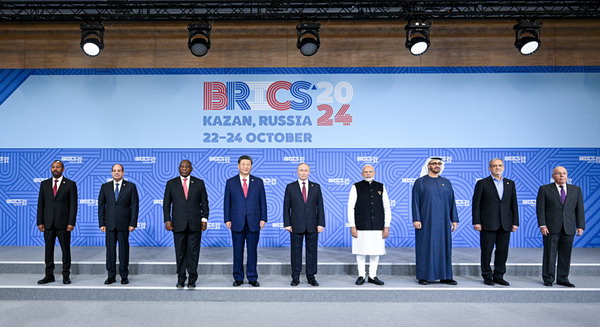On the morning of October 23, 2024 local time, the 16th BRICS Summit was held at the Kazan Expo International Exhibition Centre. Russian President Vladimir Putin chaired the event. Chinese President Xi Jinping, Brazilian President Luiz Inácio Lula da Silva (online), Egyptian President Abdel Fattah El-Sisi, Ethiopian Prime Minister Abiy Ahmed Ali, Indian Prime Minister Narendra Modi, Iranian President Masoud Pezeshkian, South African President Matamela Cyril Ramaphosa and President of the United Arab Emirates Sheikh Mohamed bin Zayed Al Nahyan, among others, were present.

Xi Jinping first attended a small-group meeting.
Xi Jinping welcomed new members to join the BRICS family and invited several countries to be BRICS partner countries. Xi Jinping pointed out that the enlargement of BRICS is a major milestone in its history, and a landmark event in the evolution of the international situation. He said, "It is for our shared pursuit and for the overarching trend of peace and development that we BRICS countries have come together." Currently, the world is experiencing an accelerated evolution of changes unseen in a century, featuring both a new multipolar landscape and the risks of a "new Cold War". BRICS countries should seize the historical opportunity, demonstrate historical initiative, and remain committed to the original aspiration and mission of openness, inclusiveness and win-win cooperation. BRICS countries should conform to the general trend of the rise of the Global South, seek common ground while reserving differences, and work with one heart and one mind to further consolidate the shared values, safeguard common interests, and strengthen BRICS through unity. BRICS countries must work together to build BRICS into a primary channel for strengthening solidarity and cooperation among Global South nations and a vanguard for advancing global governance reform.
Xi Jinping stressed that as the world becomes more turbulent, it is even more important to uphold the banner of peace, development, cooperation and win-win outcomes, refine the essence of BRICS and demonstrate its strength. BRICS countries should voice their commitment to peace, advocate a new type of security that features dialogue over confrontation and partnerships over alliances. They should seek a shared path to development, promote inclusive economic diversification and adhere to the principle of common development. They should consolidate the foundation of cooperation, deepen collaboration in traditional fields such as agriculture, energy, minerals, economy and trade, expand cooperation in emerging areas like green low-carbon technologies and artificial intelligence, and ensure the safety of trade, investment, and finance.
Subsequently, Xi Jinping attended a large-group meeting where he expressed important views on the future development of BRICS and put forward five suggestions.
Xi Jinping stressed that as the world enters a new period defined by turbulence and transformation, we are confronted with pivotal choices that will shape our future. Should we allow the world to descend into the abyss of disorder and chaos, or should we strive to steer it back on the path of peace and development? The more tumultuous our times become, the more we must stand firm at the forefront, exhibiting tenacity, demonstrating the audacity to pioneer and displaying the wisdom to adapt, as we jointly compose a new chapter in the high-quality development for greater BRICS cooperation.
- We should build a BRICS committed to peace, and we must all act as defenders of common security. Only by embracing the vision of common, comprehensive, cooperative and sustainable security can we pave the way for universal security. We must uphold the three key principles: no expansion of the battlefields, no escalation of hostilities, and no fanning flames, and strive for swift deescalation of the Ukraine crisis. We must promote an immediate ceasefire in Gaza, and make unremitting efforts toward a comprehensive, just and lasting resolution of the Palestinian question.
- We should build a BRICS committed to innovation, and we must all act as pioneers of high-quality development. We should keep pace with the times in the latest round of technological revolution and industrial transformation and foster new quality productive forces. China has recently launched a China-BRICS Artificial Intelligence Development and Cooperation Center, and will establish a BRICS Deep-Sea Resources International Research Center, a China Center for Cooperation on Development of Special Economic Zones in BRICS Countries, a China Center for BRICS Industrial Competencies, and a BRICS Digital Ecosystem Cooperation Network. China welcomes active participation from all interested parties.
- We should build a BRICS committed to green development, and we must all act as promoters of sustainable development. China's high-quality production capacity, as exemplified by its manufacturing of electric vehicles, lithium batteries and photovoltaic products, provides a significant boost to global green development. China is willing to expand cooperation with BRICS countries in green industries, clean energy and green mining, and promote green development through the entire industrial chain, so as to increase the "green quotient" of our cooperation and upgrade the quality of our development.
- We should build a BRICS committed to justice, and we must all act as forerunners in reforming global governance. The international power dynamics are undergoing profound changes, but global governance reform has lagged behind for a long time. We should champion true multilateralism and adhere to the vision of global governance characterized by extensive consultation, joint contribution, and shared benefits. We must ensure that global governance reform is guided by the principles of fairness, justice, openness and inclusiveness, and enhance the representation and voice of developing nations in global governance. We should promote the connectivity of financial infrastructure, and apply high standards of financial security. The New Development Bank should be expanded and strengthened. We must ensure that the international financial system more effectively reflects the changes in the global economic landscape.
- We should build a BRICS committed to closer people-to-people exchanges, and we must all act as advocates for harmonious coexistence among all civilizations. We should enhance the exchange of governance experiences among BRICS countries, and promote the spirit of inclusiveness and harmonious coexistence among civilizations. The initiative for BRICS digital education cooperation proposed by China has become a reality. China will implement a capacity-building program for BRICS digital education. We will open 10 learning centers in BRICS countries in the next five years, and provide training opportunities for 1,000 local education administrators, teachers and students.
Xi Jinping finally stressed that China is willing to work with all BRICS countries to open a new horizon in the high-quality development of greater BRICS cooperation, and join hands in building a community with a shared future for mankind.
Under the theme of "Strengthening Multilateralism for Just Global Development and Security", the participating leaders had an in-depth exchange of views on BRICS cooperation and major international issues of common interest.
The leaders expressed positive views on the development of BRICS mechanism and its important role in addressing global challenges. They noted that BRICS countries, with their large population, abundant resources, huge development potential, and increasing appeal and international influence, have become a model of multilateralism. BRICS countries should uphold the BRICS spirit, strengthen solidarity and coordination, deepen the greater BRICS strategic partnership, and enhance cooperation in the three main drivers, i.e. politics and security, economy, trade and finance and cultural and people-to-people exchanges. They should promote an equal and orderly multipolar world, a universally beneficial and inclusive economic globalization, and sustainable development of the world, further enhance the voice and representation of the Global South in international affairs, and work towards the building of a more just and equitable international order. BRICS countries should firmly safeguard multilateralism, uphold the core role of the United Nations in the international system, and support the United Nations in playing an important role in global governance, such as artificial intelligence. BRICS countries are committed to the peaceful resolution of disputes through dialogue and consultation, support all efforts conducive to the peaceful resolution of crisis, and respect the legitimate security concerns of all nations. BRICS countries should promote reform of the existing international economic and financial architecture and build the New Development Bank into a new type of multilateral development bank in the 21st century. They commended the UN General Assembly for adopting relevant resolutions on the International Day for Dialogue among Civilizations proposed by China, calling for respect for the diversity of world civilizations and strengthening exchanges and mutual learning among different civilizations.
The Kazan Declaration of the 16th BRICS Summit was issued and the establishment of BRICS partner countries was announced at the summit.

During the summit, BRICS leaders also received work reports from President of the New Development Bank Dilma Rousseff and other responsible officials of BRICS mechanisms, and took a group photo. Cai Qi and Wang Yi, among others, were present at the above events.